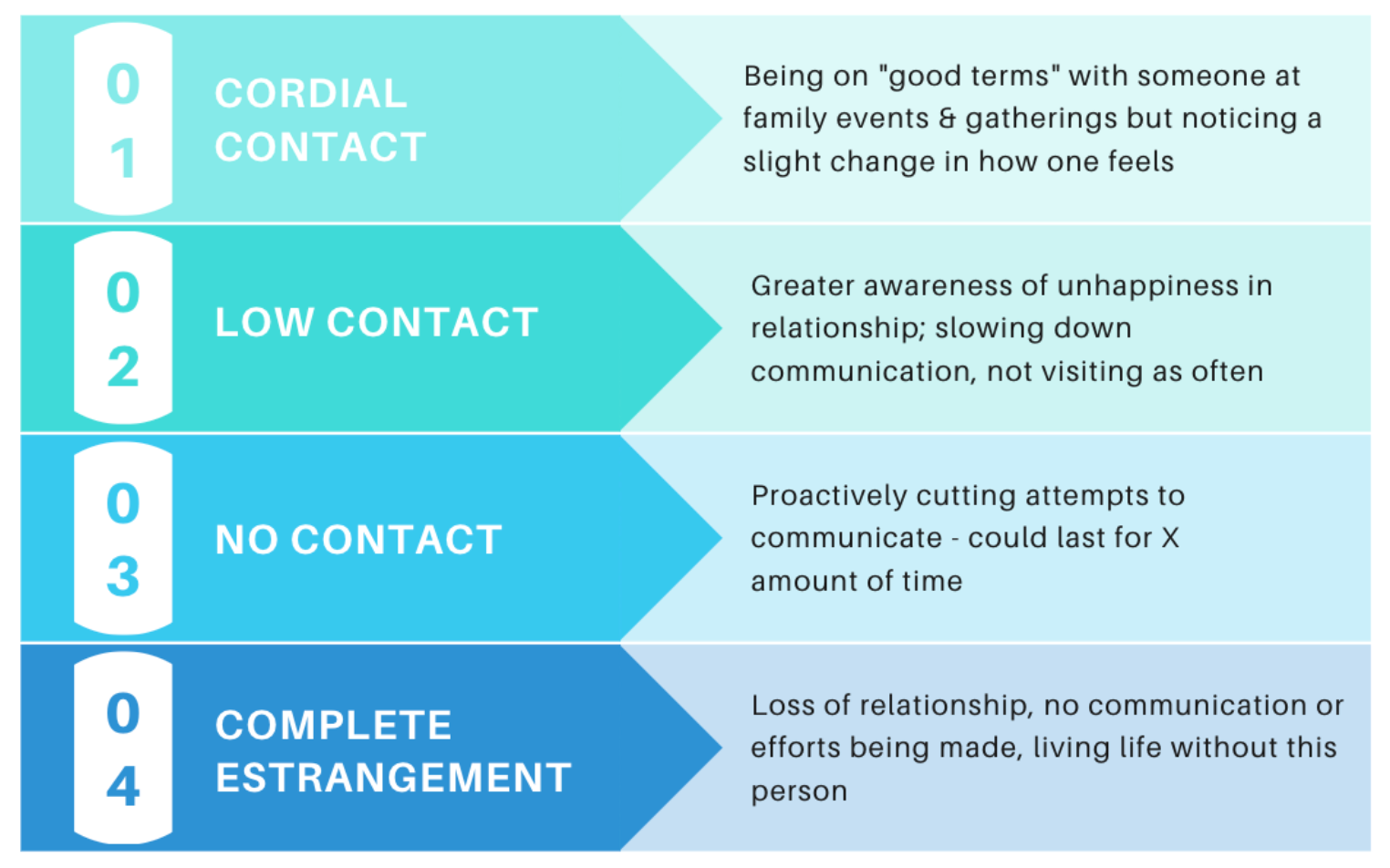This Is Why Family Estrangement Happens
This is what can lead to estrangement in families.
“Family estrangement occurs when at least one family member intentionally distances themselves from at least one other family member because of a negative relationship – or the perception of one.”
Estrangement is not a new phenomenon, but we are certainly discussing it more. While some may call it a “trend” that is skyrocketing among young people, many therapists and individuals know this is a difficult decision that family members have been forced to make for decades. Years ago, people who needed space could just move across the country and visit their family members once a year at Thanksgiving without declaring themselves “low contact,” “no-contact,” or “estranged.” But with the advent of cell phones, email, social media, and a million other forms of communication, more extreme boundaries often need to be set with family members who continue to exhibit problematic behaviors that cannot be managed with other methods.
As social stigma declines and more people become aware of how generational trauma and dysfunction manifests in families, estrangement has become a more commonly discussed topic both on and off the internet. In the past, family estrangement was a taboo, hidden topic. People who were estranged from their families hid it out of fear of being labeled “cold, unloving, or disloyal.” Now, you’re likely to see well-known celebrities, influencers, and regular people publicly discussing their estrangement stories. While some are still confused or even outraged at the idea of someone separating from their family, many of these stories are actually met with empathy and compassion. People are starting to recognize that their family isn’t the only one dealing with this issue, and they’re not alone.

We are challenging the narrative that family should be close and stay together no matter what. People are realizing that they do not need to tolerate abuse, constant criticism, contempt, or harm from their family members simply because they are family. There are many more ways to create a “chosen” family today. We no longer solely rely on our families for security, social capital, safety, and financial stability.
Family relationships are extremely important and valuable when they are supportive, healthy relationships. But when people find that others treat them much better than their own family, they might move further away from the people they were told would always love them.
What happens when a family can’t stay together?
What happens when there’s been abuse or neglect? How do family members remain close when harm continues to happen? Is it healthy to accept our family members no matter what they do? Sometimes, estrangement is the only option when all other attempts at reconciliation and repair have been unsuccessful.
Why Estrangement Happens
In the book “Fault Lines: Fractured Families and How to Mend Them,” Karl Pillemer, a family sociologist at Cornell University, details several different pathways to estrangement.
- Difficult Childhood Histories: Abusive parenting, harsh parenting, neglect, and memories of parental favoritism can all cause family estrangement. Children may become estranged from their parents after a tough childhood. Siblings also become estranged when they do not share the same childhood memories and cannot validate one another’s perspective. It’s typical to see one sibling side with an abusive parent while the other(s) choose estrangement. When family members cannot hold space for different perspectives and realities, estrangement becomes even more likely.
- Divorce: No matter when divorce happens throughout the life cycle, divorce can lead to estrangement when not handled properly. When children are put in the middle of their parent’s conflict, there has been abuse between the parents, or children cannot form a relationship with each parent in a healthy way, estrangement is much more likely. Research shows that children are more likely to lose contact with their fathers, but the disruption can weaken the ties to both parents.
- Money, Inheritances, and Business Deals: Money is a source of power, and family members may use money, inheritance, or a business to assert control over certain family members. Greed can blind people and cause them to act in ways they otherwise would not. Entitlement may also lead to elder abuse or abuse of other vulnerable adults. When family members feel they are not being “given what they deserve” or think they’re being manipulated and controlled with money, estrangement can happen.
- Problematic In-Laws: Whenever new family members enter the picture, the dynamics in the family change. In-laws who are controlling, dismissive, or unwelcoming of the new family member may be met with distance or boundaries. Estrangement tends to happen when a parent forces their child to choose between them and their new partner. Estrangement is also likely when new children or grandchildren are born, and the in-laws do not respect the parents' wishes or try to be a healthy force in everyone’s life.
- Lifestyle and Value Discrepancies: This is a more recent phenomenon in families. In the past, the family was expected to “stick together no matter what,” and value or lifestyle differences were not considered a valid reason for estrangement. Today, political differences, identity, and fundamental differences in values are very important and have the power to tear families apart. When family members cannot find ways to accept their members for who they are and how they choose to live their lives, estrangement can happen. Family members who are not accepted by their family may choose to engage with other friends or peers who are more expecting.
- Unrealistic Expectations: This is a phenomenon I see happening more and more as a family therapist. Family members have exceedingly high (not communicated) expectations of each other that cannot be met. Our lives have become increasingly busier, and it’s hard to keep up with people who do not understand. Family relationships are one of the most important things in our lives, but tensions rise when family members do not understand the circumstances someone else is living through. Family members need to be understanding of the constraints members have on their time and abilities because of illness, financial struggles, young children, etc.
- Mental Health Issues And Substance Usage: Many families choose to become estranged from a family member whose mental health symptoms have become destructive or unmanageable. Individuals struggling with addiction or other mental health diagnoses may also cut off their family members because they do not want to follow boundaries around substance usage or certain behaviors.
The most common themes among estranged family members are:
- inability to treat each other with kindness and respect
- inability to hold space for each person’s perspective
- no changed behavior
If family members can listen to each other’s perspective, take accountability, change their behavior, and treat each other respectfully, they may experience some of the difficult situations listed above and not become estranged. The families who struggle the most and have the highest chance of becoming estranged are those who cannot communicate respectfully, can only see their side, and refuse to take accountability or change their behavior. Estrangement does not happen overnight, and it is often not repaired that quickly. These are longstanding, deeply entrenched patterns of family behavior that must slowly be unraveled and changed.
Levels Of Estrangement
Together Estranged created this great chart of the different levels of estrangement. It’s important to remember that estrangement is not always permanent; it can be episodic or temporary, depending on the issue.

Many people move through each of these levels of estrangement before reaching “complete estrangement.” It’s also possible that you have succeeded with going low-contact or no-contact with certain family members. One of the biggest influences on the level of estrangement is how the other person responds to new boundaries in the relationship. When one person attempts to pull away and solely engage in “cordial contact,” and the other responds to that distance by harassing them, demanding more contact, and violating boundaries, the distancer will likely decide to move up on this scale to low-contact or potential no-contact. The decision to move up this scale is typically made because the person realizes there is insufficient space between them and the other person to achieve safety, peace, or stability.
“No-contact” and “complete estrangement” both involve eliminating contact with this person. But, “no-contact” may only be temporary until a specific change or goal has been reached. “Complete estrangement” tends to be more permanent and involves living as if this person is no longer alive or part of your life. Most people who use this word seem to believe there is a different level of finality to the end of this relationship.
10 Quotes To Help You Feel Less Alone When You Are Estranged From Your Family
“We end up being strangers to those who have known us for too long.”― Luigina Sgarro
“But they're your parents," Malcolm said to him once a year or so. "You can't just stop talking to them." But you could, and you did: he was proof of that. It was like any relationship, he felt—it took constant pruning, and dedication, and vigilance, and if neither party wanted to make the effort, why wouldn't it wither?”― Hanya Yanagihara, A Little Life
“It’s perplexing how family members claim their undying love for us. They can say whatever they choose, but their actions and behaviors don’t match their words. There is an imbalance in the relationships with distinct discrepancies, especially in who overpowers the scapegoat.”― Dana Arcuri, Certified Trauma Recovery Coach, Soul Rescue: How to Break Free From Narcissistic Abuse & Heal Trauma
“I wanted to forgive my mom and my dad so badly for the deep hurt they caused, the fear their broken marriage invoked in me, but I also didn’t want to pretend anymore. Pretending is exhausting.”― Natalie Brenner, This Undeserved Life: Uncovering The Gifts of Grief and The Fullness of Life
“Anyone who has lived through it, or those who are now living through it, knows that caring about an addict is as complex and fraught and debilitating as addiction itself.”― David Sheff, Beautiful Boy: A Father's Journey Through His Son's Addiction
“How can both Nics, the loving and considerate and generous one, and the self-obsessed and self-destructive one, be the same person?”― David Sheff, Beautiful Boy: A Father's Journey Through His Son's Addiction
“I know they love me, and I love them, but I don’t know how to forgive them.”― Olivia Dade
“My dad had limitations. That's what my good-hearted mom always told us. He had limitations, but he meant no harm. It was kind of her to say, but he did do harm.”― Gillian Flynn
“do not look for healingat the feet of thosewho broke you”― Rupi Kaur, milk and honey
“Even when estrangement is a clear headed choice—a survival mechanism to move forward from abuse or unbearable discord—the cutoff leaves disconnected siblings in a world of secrecy and shame.”- Fern Schumer Chapman